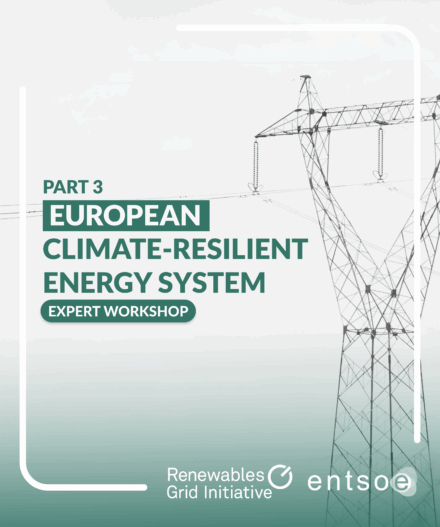In collaboration with European Network of Transmission System Operators for Electricity (ENTSO-E), RGI is launching a survey aimed at informing a database on climate hazards and extreme weather events, and corresponding climate adaptation and resilience measures implemented in electricity grid infrastructure. The survey results hope to provide insights for the ENTSO-E’s the Cost-Benefit-Analysis (CBA) methodology, applied in the European grid planning process.
Increasing climate change and extreme weather events such as floods, wildfires and heatwaves are posing acute implications on electricity infrastructure in Europe and challenges for a stable and secure electricity supply. To address them, grid operators pursue additional investments in preventive, mitigation or restorative measures to keep electricity systems in operation.
To reflect upon accelerating climate change and its impacts on electricity infrastructure, the European electricity grid planning process is required by the TEN-E Regulation to consider climate adaptation aspects. Addressing this requirement, ENTSO-E’s Cost-Benefit-Analysis (CBA) methodology, which assesses long term electricity grid planning, should be adjusted to incorporate a new quantitative indicator for climate adaptation and resilience measures. The new indicator is to be incorporated into the 5th edition of the CBA Guideline and into the 2026 Ten-Year Network Development Plan (TYNDP), complementing other CBA indicators.
RGI and ENTSO-E have been working together over the past two years to develop a framework guiding the new indicator, with one element of this framework being a database of climate hazards and corresponding adaptation and resilience measures implemented in electricity grid projects.
To enrich the database with real-world cases and best practices, RGI and ENTSO-E have launched a survey to collect inputs related to existing and planned climate adaptation and resilience practices and measures among grid operators, in Europe and beyond. The information collected will be used to validate and receive additional data necessary to improve the accuracy and reliability of the database, as well as to identify current and future needs. The database is planned to be publicly available in 2026 and support the knowledge exchange on that topic.
contact
Dr. Andrzej Ceglarz
andrzej[at]renewables-grid.euDirector – Energy Systems

Dr. Ira Shefer
ira[at]renewables-grid.euManager – Energy Systems






